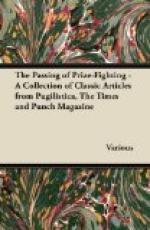* * * * *
“Though to-day is Primrose Day....”—Daily Mirror, April 12th.
At the risk of being thought behind the times, we ourselves deferred our celebration until April 19th as usual.
* * * * *
[Illustration: “YOU SETTLE WITH HIM. YOU’RE CHAIRMAN OF THE ANTI-PROFITEERING COMMITTEE.”]
* * * * *
AT THE PLAY.
“BIRDS OF A FEATHER.”
It is nearly always a good thing for the author of a play to know what he is after, and if he can get his audience to follow him so much the better. It is quite possible that Mr. ESMOND had an idea in his head when he wrote Birds of a Feather, but if so he never let me get at it. Up to the very end I had no conception of what he was trying to illustrate, unless it was the trite theory that we are the creatures of our environment.
That, at any rate, was how Constance (of “the House of Ussher”) explained her vagaries, though I couldn’t see why. The daughter of a very rich Jew, whose Christian wife had run away from him, she was brought up in great comfort, which included the love of a peer’s son, her father’s secretary. It is true that her stern parent would not hear of their union; but that has no doubt happened to young heiresses before now without turning them into criminals. With Constance however it seems to have been different. She had gathered from what she knew of her father’s career that there must be easy ways of making money if you are not too scrupulous, so she forged his name for a thousand pounds with speculative intent. It was open to the old man to regard this as an act of filial piety, since it was an attempt, however crude, to follow the parental tradition; but apparently forgery had not been one of his foibles and he threatened her with the law unless she gave up the idea of marrying the secretary, now dismissed from his service.
Meanwhile she has been carrying on a secret intrigue with that gentleman (she must have got this from her “Christian” mother), and when her father comes to know of it he suddenly exhibits an unsuspected gift of sentimentality ("My baby Con! my baby Con!” he sobs), and, in terror lest his ewe-lamb’s name should be tainted by the breath of scandal, he offers his late secretary a heavy sum of money to make an honest woman of her. It sounds a little inconsistent, but of course there may have been a nice differentiation in the old rogue’s mind between a moral and a criminal offence, in favour of the latter.
As for Constance I have seldom met a less seizable character. If she was the result of environment there was no visible sign to show how it infected her. We simply had to take Mr. ESMOND’S word for it. To me the menage seemed to be of the most respectable. But, of course, you can always attribute anything to your surroundings. One environment is vicious and so drives you to vice; another is virtuous with the same effect. Constance might condemn hers, but it never had a chance with a girl like that.




